Photographs: Jahnavi Sheriff Shameem Akthar
The wide-legged poses in yoga are powerful tools in emotional culturing. They do this by challenging several aspects of our body and mind. By challenging the body, particularly the load-carrying legs, they cultivate emotional stamina and will power. They also service the uro-genital system and thus affect the flow of powerful hormones that also have a say in how we view ourselves and in our happiness quotient.
Initially, beginners may not be able to reach far into the poses and some may even need to bend their legs in certain poses to reach deeper into them. Start off by holding them for just a few seconds initially. First work on deepening your flexibility in the poses. After this is achieved you may increase the duration in the final pose to further up the challenge and improve your physical and mental stamina.
There are several variations of the wide-legged poses, some of them part of extremely tough warrior yoga or virabhadrasana. Shameem Akthar, yogacharya trained with the Sivananda Yoga Vedanta Center, leads you through a few to help you centre yourself and up your happiness quotient.
For more of Shameem's yoga writings and workshops log into http://jaisivananda.blogspot.com.
(This column only seeks to share the author's enthusiasm towards yoga. Yoga is best learnt under expert guidance.)
Prasarita padottanasana (Wide-legged spread angle pose)
Stand with your feet a meter or so apart. Your feet should be pointed straight ahead. Inhale, lifting both hands up. Exhale, lower both hands down to touch the floor. Continue normal breathing. Push your hips back further, look ahead. Hold the pose for a few seconds. You may increase the duration with regular practice.
Benefits: Tones the spine. Ups mood. Builds stamina. Tones whole body.
Trikonasana (Triangle pose)
Stand up, with your feet a meter apart. Flare out your right foot. Adjust your left foot slightly, turning it inwards. Inhale, extending your arms out to shoulder level. Exhale, twist to the right side, reaching your left hand to hold your right leg wherever you can reach it (the lower the better). Extend your right hand up in the air. Continue normal breathing throughout. Hold for a few seconds, looking up at the extended hand. Then inhale deeply to return to the centre.
Release and repeat for the other side.
Benefits: Is a great detox, because of the squeeze on the internal organs. Improves balance and mental focus. Hikes mood. Removes spinal defects.
Parivritti konasana (Twisted angle pose)
Stand up straight, your feet a meter apart. Flare your right foot out to the right side. Inhale, lift your left hand up, so it touches your left ear. Exhaling, bend your torso from the waist, sliding your right hand along your right leg till it reaches the ankle. Hold for a few seconds. Continue normal breathing, adjusting the pose so your torso does not tilt forward.
Release by sliding your arm back along your leg to the starting position. Repeat for the other side.
Benefits: Detoxifies. Services the liver. Tones the spine and its nerves powerfully. Improves posture. Hikes mood.
Parsva konasana (Side-stretch pose)
Stand up straight, with your feet a meter or more apart. Your right foot should be flared out to the right. Inhale. Exhaling lunge to the right by bending your leg at the knee. Place your left palm flat on ground beside your right foot. Lift your right hand straight, as shown in the image. Look at your hand, continuing to breathe normally. Extend the back leg well, to ensure your foot is flat on the ground. Hold for a few seconds.
Release. Repeat for the other side.
Benefits: Improves flexibility, tones the spine. Removes and prevents most spinal problems. Trims fat.
Dwikonasana (Double angle pose)
Stand with your legs a meter apart. Flare your right foot out, and your left slightly turned inward. Inhale, grasping your hands behind you, interlocking your fingers. Exhale, lunge to the right, and lower your head to reach your forehead to the knee. The back leg should be straight. Straighten your hands behind you as high as possible. Continue normal breathing throughout.
Release, return to centre and repeat for the other side.
Benefits: Calms. Tones spine. Relieves emotional tensions.

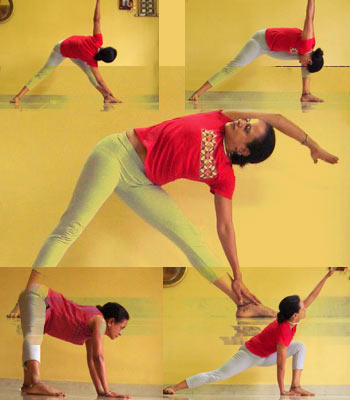
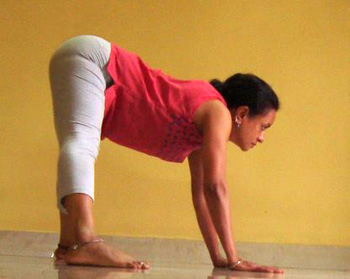
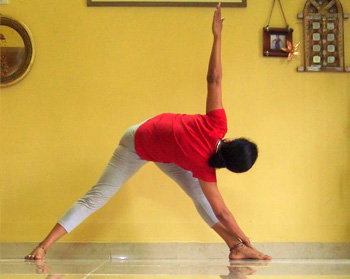
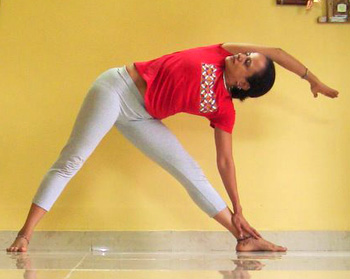
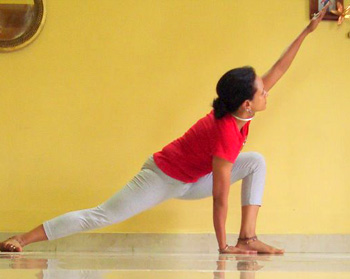
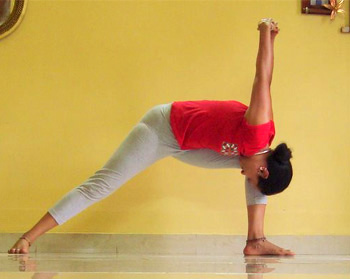
Comment
article